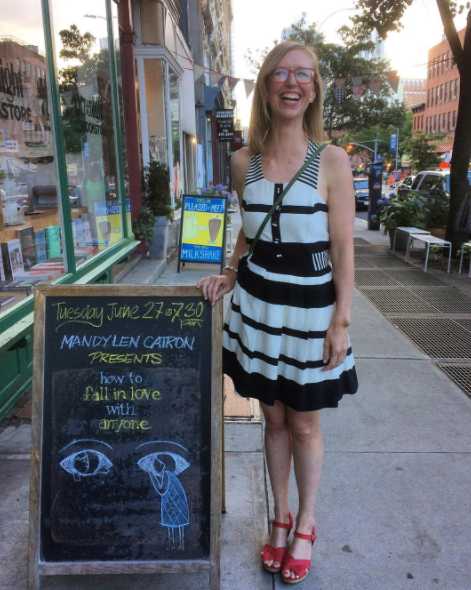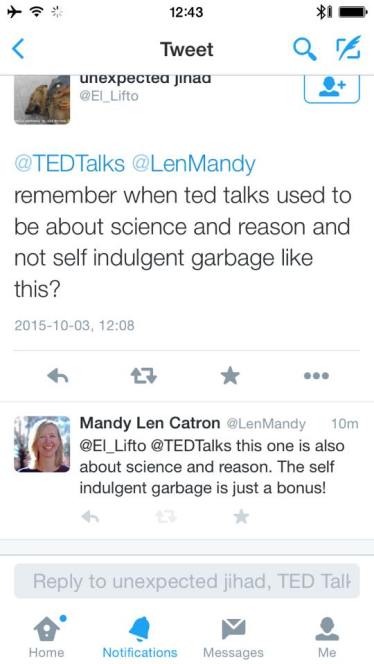This thing that takes up your whole life, your whole body, your whole mind; it’s all your dreams, and then suddenly […] it’s going to be just one little tiny tile on iTunes, one little tiny click. It’s not gonna be this thing that’s my feeling of my entire insides and my whole soul shape. It’s just gonna be a little square that people can choose. And that’s a really awful feeling.
Jill Soloway on making Afternoon Delight. On Fresh Air
About a month before my book came out I wrote Soloway’s quote in my journal. I was hoping, I guess, to keep things in perspective. Publishing a book I’d been working on for eight years felt enormous, but I wanted to remember that it was also small. It was a tiny tile on Amazon. It was a set of bound pages that would, for a time, live on a bookshelf in a bookstore and then, eventually, be taken home to put on another shelf or, if it didn’t sell, sent back to the publisher’s warehouse. It would collect dust. It would get recycled. Yes, it might mean something to someone—if I was lucky, if I had done a good job, it might mean a lot to someone—but it would never mean as much to anyone as the writing of it had meant to me.
So I tried to prepare for this inevitable shift in perspective, for the moment the book would feel small. I waited for it. At the height of book tour chaos—when I was stuck in Detroit at midnight with no way to make it to Austin for the class I was supposed to teach the next morning—I even longed for it. I was sure that, even though it felt awful to Jill Soloway, it wouldn’t feel so bad to me. I was sure that seeing my book take its place amongst a zillion other books would be fine—because I was ready, already, to get started on a second book. There was work to do.
But before I could do that work, I had to write a bunch of articles and do a lot of interviews and go to a handful of cities and launch this thing that is in fact the shape of my soul into the world to live its own unpredictable life without me.
I’m not sure how anyone “keeps things in perspective” while talking about this part of her soul all day every day for three weeks straight. I don’t know what I was thinking. Or I do. I was thinking I could master my emotions. Because it’s easy to convince yourself that mastering your emotions is within your domain when you spend your days doing interviews about “choosing” to fall in love. Of course you can choose to glide right along, to believe that you will do the strange work of distilling years of reflection into four-minute local tv interviews and then return, focused and unharmed, to the daily work of being a writer.
There was, for the record, one perfect night at the Greenlight Bookstore in Brooklyn. It was the official day of publication (June 27) and the room was full and the crowd asked interesting questions and they laughed at all of my jokes. I felt perfectly self-possessed and proud of the thing I had made—as if this one evening was the rightful culmination of years of work and study. My partner and my best friend and my agent and my editor and my whole team at Simon & Schuster all stood in the crowd, along with some old friends I hadn’t seen in years. At the end, folks lined up to have me sign their books—which I knew they would do (I’d bought a box of pens just for that purpose!) but still it felt surreal. I was scared of misspelling someone’s name, of talking to one person for too long or not long enough, of seeming anything other than completely grateful that someone wanted to pay for this thing that was shaped like my soul.

I knew as soon as it was over that no event would ever go quite so perfectly, but that sense of possibility—that I was becoming the person I’d set out to be the day I first applied to do an MFA fifteen years ago—felt exciting. And this possibility is, I think, the central hope and promise of a book tour.
On the whole, the tour was equal parts fun and uncomfortable. Starting about two weeks before I left, I had a hard time sleeping. I could only make it partway through a meal without feeling nauseous. I eventually gave up and just ate and slept when I could and I was surprised to find that worked okay. Continue reading


